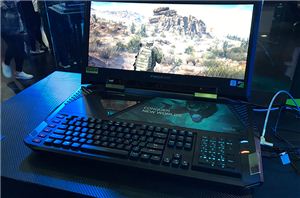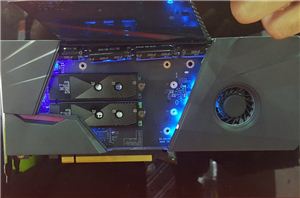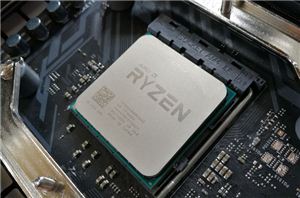Realtek Demonstrates RTD2893: A Platform for 8K Ultra HD TVs
by Anton Shilov on June 19, 2019 10:00 AM EST- Posted in
- Monitors
- Displays
- Trade Shows
- UltraHD
- Realtek
- 8K
- Computex 2019

Just like with any other major transitions, the shift to 8K Ultra HD TVs will require not only new display panels (and even new display technologies), new cables, and new media, but also new codecs as well as new SoCs. To this end, Realtek demonstrated its first platform for 8K televisions and Ultra HD set-top-boxes/players at Computex.
Realtek’s RTD2983 SoC can support decoding 8K resolution videos encoded using the AV1, HEVC, and VP9 codecs. The chip can process all HDR formats, reduce noise, upscale, and perform all the other functions common for processors for televisions and digital media players. The RTD2983 has PCIe and USB 3.0 interfaces, it can receive data via an HDMI 2.1 48 Gbps interface, and transmit pixel data over Vby1 wires. One advantage the RTD2983 has is embedded memory, which eliminates necessity to use external DRAM devices, lowering the BOM costs for finished products.
Since Ultra HD content is scarce, Realtek demonstrated the RTD2983 platform at Computex using a static picture encoded using one of the aforementioned codecs. The lack of complex motion is a bit of a letdown here, but considering how hot the SoC's heatspreader got, Realtek certainly wasn't running a light workload here.
As for consumer applications for the new chip, Realtek ultimately brought the RTD2983 to Computex to show potential customers that it's ready, and that interested parties can start designing their devices based on the SoC. Though keeping in mind long design cycles for consumer electronics, it bears noting that we won't see Realtek's new SoC show up in finished products for a while yet. But in a year or two down the line, this is likely to be one of several SoCs we'll see at the heart of various mass-market Ultra HD boxes.
| Want to keep up to date with all of our Computex 2019 Coverage? | ||||||
 Laptops |
 Hardware |
 Chips |
||||
| Follow AnandTech's breaking news here! | ||||||













23 Comments
View All Comments
Azethoth - Thursday, June 20, 2019 - link
Also it literally said that it is able to decode video. So I think the onus is on disbelievers to prove that, bizarrely, they are lying about being able to do video and that somehow they will fool 3rd parties into buying a SOC that can only do still pictures. Some truly thoughtless comments so far.mode_13h - Friday, June 21, 2019 - link
> the onus is on disbelievers to prove that, bizarrely, they are lying about being able to do videoHey, if you want to buy early silicon based on specs alone, be my guest. What we know is their demo very much falls short of their claims, and the stated reason doesn't add up. I'm not saying they can't ultimately deliver a SoC that meets their specs, but I think the onus is very much on Realtek, at this point.
> Some truly thoughtless comments so far.
Yeah, like the idea that anyone is going to make an on-the-spot purchasing decision, as you imply.
mode_13h - Friday, June 21, 2019 - link
Yeah, it's a bit of a fallacy that still images are inherently cheaper to decode. If it truly was an AV1-encoded keyframe, then it's potentially more expensive to decode than a typical P frame.However, the thing you can't tell from a still image decode is just what framerate it's managing. That could be the real reason they didn't show anything involving motion.
Santoval - Wednesday, June 19, 2019 - link
"or anything else in 8K"As you can read in my comment above there are plenty of cameras able to shoot perfectly 8K video. TV sets able to output 8K content have also been demonstrated. However encoding and decoding 8K video with AV1 is an entirely different thing. H.265 can also be used (but *not* H.264, it doesn't support 8K), but 8K probably pushes it to its limit in terms of efficiency, while it's notorious license issues are a deterrent.
Beside AV1 there is also the upcoming H.266/VVC (Versatile Video Coding), which is the actual successor to H.265/HEVC. This will not be royalty free (obviously) but it will have much more simplified licensing terms (similar to H.264). It will not be finalized before late 2020 - early 2021 though, so AV1 has quite a head start. A possible codec war is brewing...
nandnandnand - Wednesday, June 19, 2019 - link
Hopefully we will see solid progress on AV2 before VVC hits the scene. MPEG needs to lie with the fishes.https://rethinkresearch.biz/articles/ao-media-look...
There are features that didn't make the cut in AV1 for various reasons, including too much increased complexity. With AV1 already beating HEVC, AV2 could be their chance to throw everything and the kitchen sink in.
GreenReaper - Wednesday, June 19, 2019 - link
AV1 for real is big news, if it's being hardware decoded. Apparently the RTD1311 does the same for 4K:https://www.realtek.com/en/press-room/news-release...
https://www.realtek.com/en/press-room/news-release...
nandnandnand - Wednesday, June 19, 2019 - link
Yeah, this is the first product I've heard of that will support AV1. We need to see more of that.GreenReaper - Wednesday, June 19, 2019 - link
There have been others, apparently, but this is the first 8K:https://en.wikipedia.org/wiki/AV1#Hardware
I'd be glad to see Level 5.1 decode capability on a AMD "4600G" Zen 2 7nm. Little point in 8K content I can't view and probably can't stream (4K 60FPS Main is up to 40Mbit): https://en.wikipedia.org/wiki/AV1#Profiles_and_lev...
It'd match what they offer for other video formats - unless this changes with Navi's codecs:
https://en.wikichip.org/wiki/amd/ryzen_5/2400g#Gra...
nandnandnand - Wednesday, June 19, 2019 - link
So 3 products with AV1 decode, including another RealTek SoC announced a couple weeks ago. Not much.As for AMD Navi, it looks like it will not decode AV1:
https://www.techpowerup.com/256481/amd-navi-radeon...
https://www.techpowerup.com/img/cf96IBWB2r9zYZ25.j...
I don't know if it will be any different for laptop or desktop APUs, but that doesn't look encouraging. Looks like we'll have to wait for Zen 3 and "7nm+" GPUs if we want AV1 hardware decode support.
GreenReaper - Thursday, June 20, 2019 - link
I'd be a tad surprised if the video codec block can't be upgraded separately from the rest of the graphics hardware. It's its own dedicated subprocessor. Case in point: Raven Ridge, which added hardware decode of VP9 (a big deal for laptop battery life given YouTube's preferences):https://www.x.org/wiki/RadeonFeature/#index9h2
There was other Vega graphics hardware out, but it didn't have that feature; some may still not.